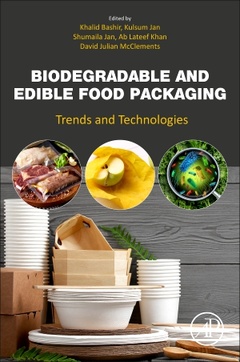Description
Biodegradable and Edible Food Packaging
Trends and Technologies
Coordinators: Bashir Khalid, Jan Kulsum, Jan Shumaila, Khan Ab Lateef, Mcclements David Julian
Language: English
Subject for Biodegradable and Edible Food Packaging:
556 p. · 15x22.8 cm · Paperback
Description
/li>Contents
/li>Biography
/li>Comment
/li>
Biodegradable and Edible Food Packaging: Trends and Technologies presents the concept, status and recent advancements of Biodegradable and Edible packaging materials. The book offers broad and available information regarding principles of food packaging and its applications in different area of food and non-food. Chapters bring a detailed overview of the interaction of constituents and properties like physiochemical, mechanical, microbiological and engineering. The book also serves latest information regarding the packaging requirements of almost all food groups, including knowledge regarding biodegradable and edible food packaging materials that reduce environmental pollution.
This is a solid reference book that helps readers understand different benefits of using biodegradable and edible films and their development and suitability with various foods.
2. Biodegradable and Edible Packaging Materials
3. Manufacture of Biodegradable Food Packaging
4. Engineering Properties of Edible films
5. Starch-based Food Packaging
6. Cellulose and hemicellulose-based packaging
7. Gum-based Food Packaging
8. Protein-based Food Packaging
9. Lipid-based Food Packaging
10. Application of Nanotechnology in Food Packaging
11. Active Packaging Materials
12. Smart Food Packaging Materials
13. Impact of Edible Packaging on Food Quality
14. Emerging Trends in Food Packaging
15. Modeling Mass Transfer in Biodegradable and Edible Packaging
16. Application of Biodegradable packaging to different food materials
Dr. Kulsum Jan?started her carrier in Food Technology as a founding batch in 2006 from Islamic University of Science and Technology (IUST). She received Senior Research Fellowship from CSIR, GoI, with Young Scientist, Best paper and best poster awards in various National and International conferences. She was awarded with Post-Doctoral Fellowship from CSIR, GoI and is currently working as Assistant Professor at Jamia Hamdard. She has done exceptionally well in the department by receiving various awards for outstanding research. She has been granted UGC research project for the valorization of the agricultural wastes. She has also served as organizing committee member of various Conferences organized by the department of Food Technology, Jamia Hamdard. Dr Jan is also acting as Academic counselor for IGNOU course PG Diploma in FSQM and is a life member of?Association of Food Scientists and Technologists India (AFSTI) and?Probiotic Association of India.
Dr. Shumaila Jan is presently working as an Assistant Professor in the Department of Food Science and Technology, National Institute of Food Technology Entrepreneurship and Management Kundli Haryana India. Dr. Jan has been in the field of Food Technology since 14 years when she joined the Bachelor of Food Technology at IUST Awantipora. She has published a nu
- Presents strategies and techniques for the development of new and innovative packaging materials
- Brings information regarding emerging trends like the exploration of underutilized sources and the use of agricultural and industrial waste for the production of packaging material
- Covers the importance of designing and implementing food packaging programs and nanotechnology, along with limitations and safety issues
- Provides knowledge on the interaction of constituents like starch, protein, cellulose, etc.
These books may interest you

Innovations in Food Packaging 171.65 €



